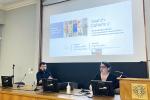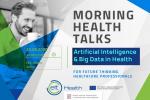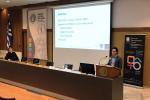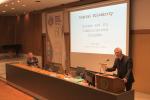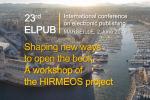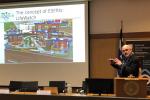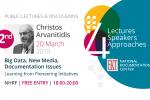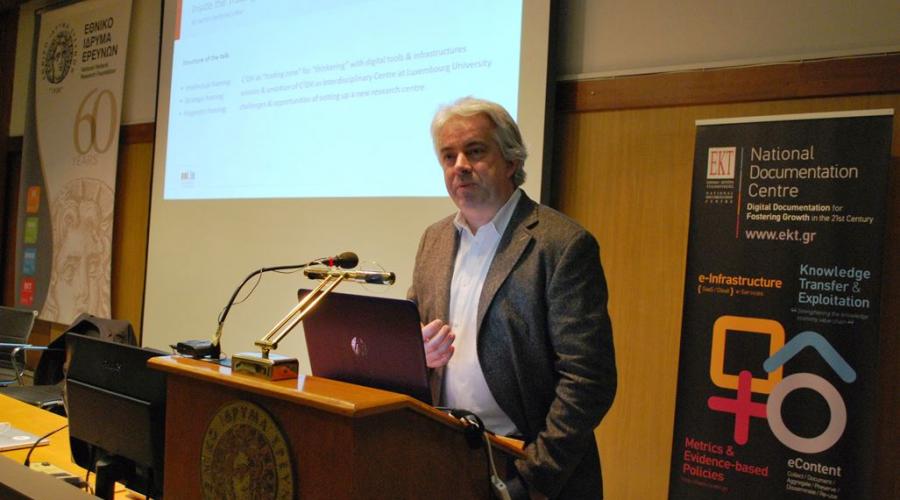
A very interesting lecture on Digital Humanities was given by Andreas Fickers, Professor of Contemporary and Digital History at the University of Luxembourg and the Director of the Centre for Contemporary and Digital History (Luxembourg Centre for Contemporary and Digital History, C2DH), on Wednesday 6 February at the National Hellenic Research Foundation.
The lecture launched a new series of lectures entitled 'Big Data, New Media, Documentation Issues: Learning from innovative projects' organised by the Scientific Council of the National Documentation Centre, with the support of the National and Kapodistrian University of Athens' Interdepartmental Programme of Graduate Studies - 'Science, Technology, Society - Science and Technology Studies'.
Professor A. Fickers talked about the C2DH innovative project and shared his thoughts on the situation in Digital Humanities, suggesting the direction in which Digital History should move in order to produce the best results. According to A. Fickers there are three "waves" / time periods of what we call Digital Humanities. During the first wave, (from the early 1950s and lasting for about three decades) those involved in Digital Humanities comprised only a small group of scientists who were mainly from the fields of linguistics and history but had a knowledge of computers. This small group had a particular impact on the scientific community.
In contrast, the second wave that lasted from 1990 to about 2010, began with the mass digitisation of historical sources. To allow for this large-scale digitisation the necessary infrastructure and computational tools required for the creation and utilisation of large databases had to be developed. Although this had significant results, there was strong criticism, namely that the direction taken by historical research is driven to a large extent, if not exclusively, by technology (as research questions were posed not with reference to how important it is to understand a historical period, but according to whether they could be answered using the capabilities and tools provided by technology).
The third wave acknowledges the weaknesses of the second wave and brings to the fore the tension that exists between explanation and understanding. The existence of computational tools with increased capabilities for collecting and processing data gives historians the opportunity to collect Big Data and appreciate it through analysing explanatory schemes with universal validity. However, according to A. Fickers, this approach does not help with in depth understanding, and is not guided by specific questions.
As noted by A. Fickers, the classical interpretation used for the last two centuries (some of the most typical representatives are Heidegger, Dilthey, Gadamer, Ricoeur, Habermas) is needed to achieve an understanding of a historical period. Therefore, in this stage, we find ourselves between classical and technology driven interpretations. What we need is a new type of procedure that combines the two approaches so as to come up with a new 'digital interpretation'.
Achieving this needs tools from different disciplines, such as history, computer science, anthropology, economics, linguistics, etc. This is where the concept of the Trading Zone, introduced by science historian Peter Galison comes in. According to Galison, despite the big differences both as to the meaning or the importance attached to objects, as well as to the practices used, scientists from different fields can create a common language so they can communicate in a Trade Zone.
Thus, a scientific subject can be studied from different perspectives, but collaborative work can lead to a common approach. For A. Fickers C2DH is an important example Trade Zone, where historians, anthropologists, economists, IT experts work together in a common area and produce digital history.
But what is digital history? How could it enrich the historical narrative? These questions remain open, but there are some ideas as to what we could expect as a product of digital history. As A. Fickers noted, historians can not only use digital sources (eg television, radio, internet) to tell their stories, but also visual exhibitions, podcasts etc. Historians have long discredited the use of these tools, leaving them to non-professionals such as journalists to use. However, as A. Fickers underlined, this is something that needs to change.
All the lectures, which are free of charge, will be held at the National Hellenic Research Foundation and will interest students, researchers, scientists across disciplines, etc.








